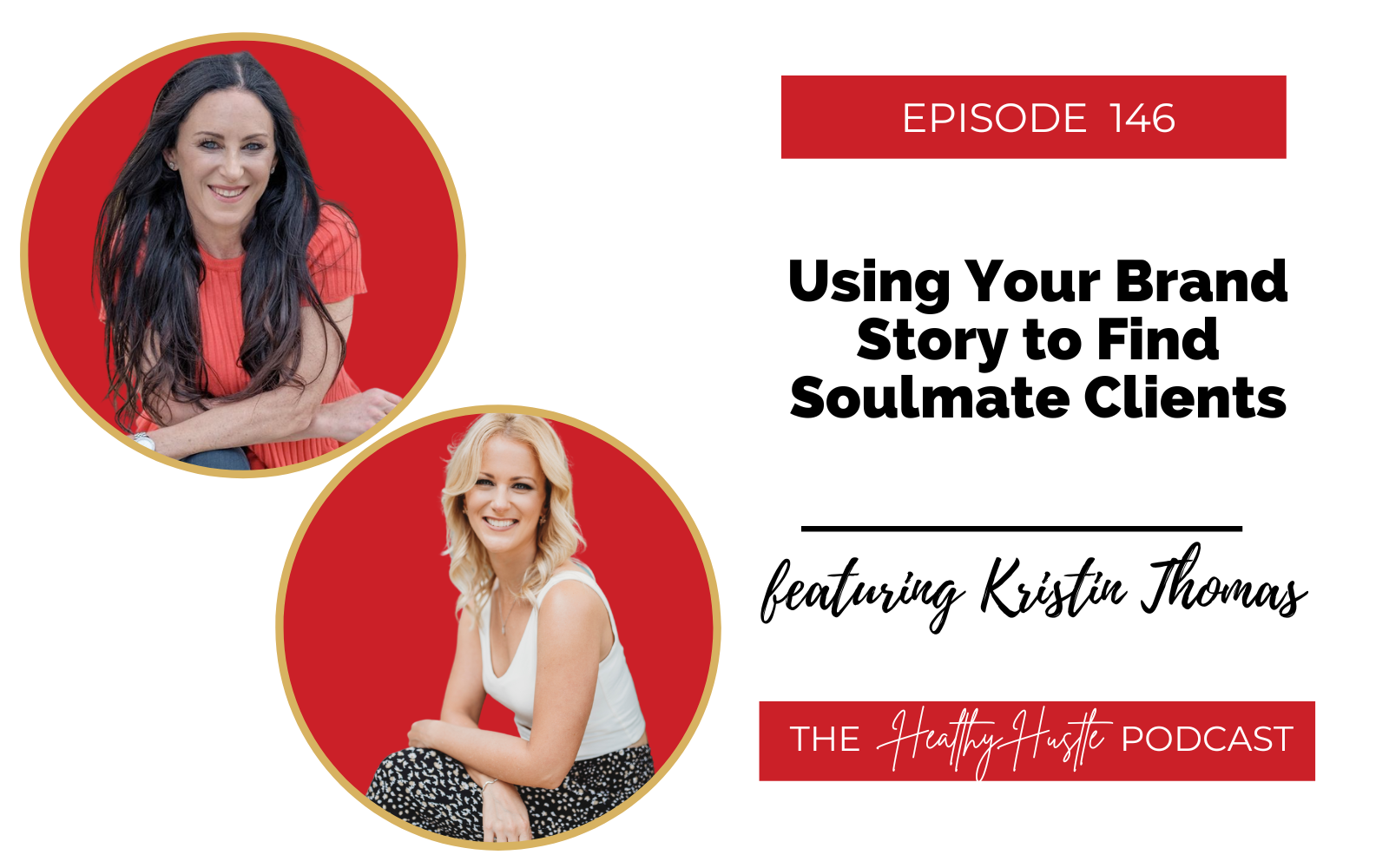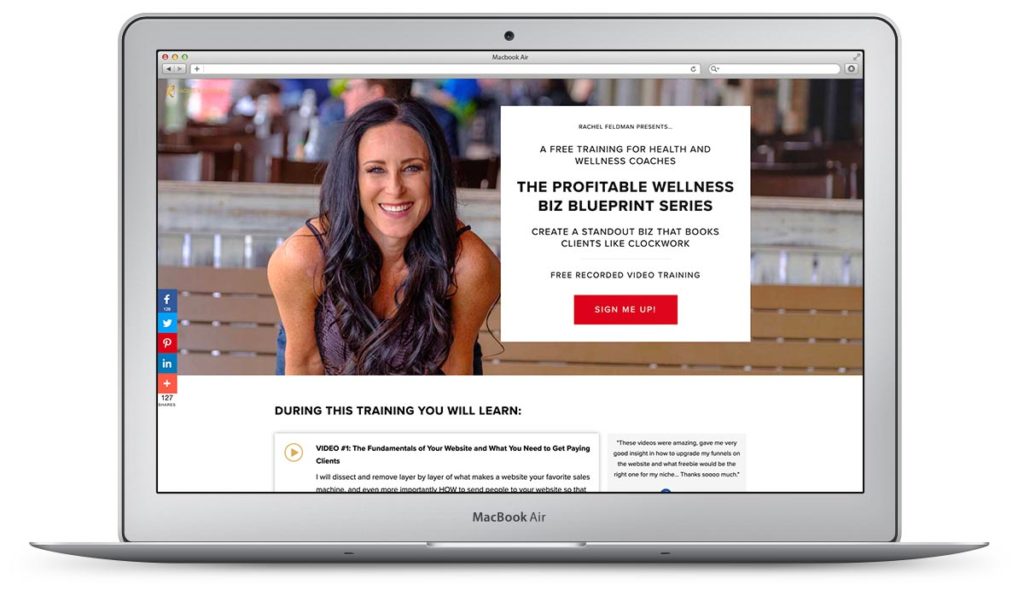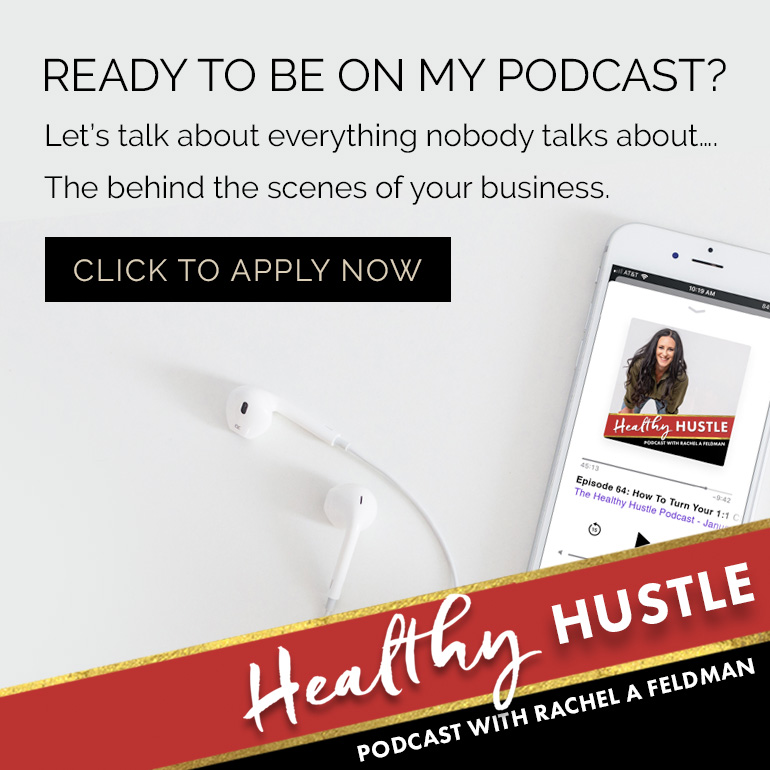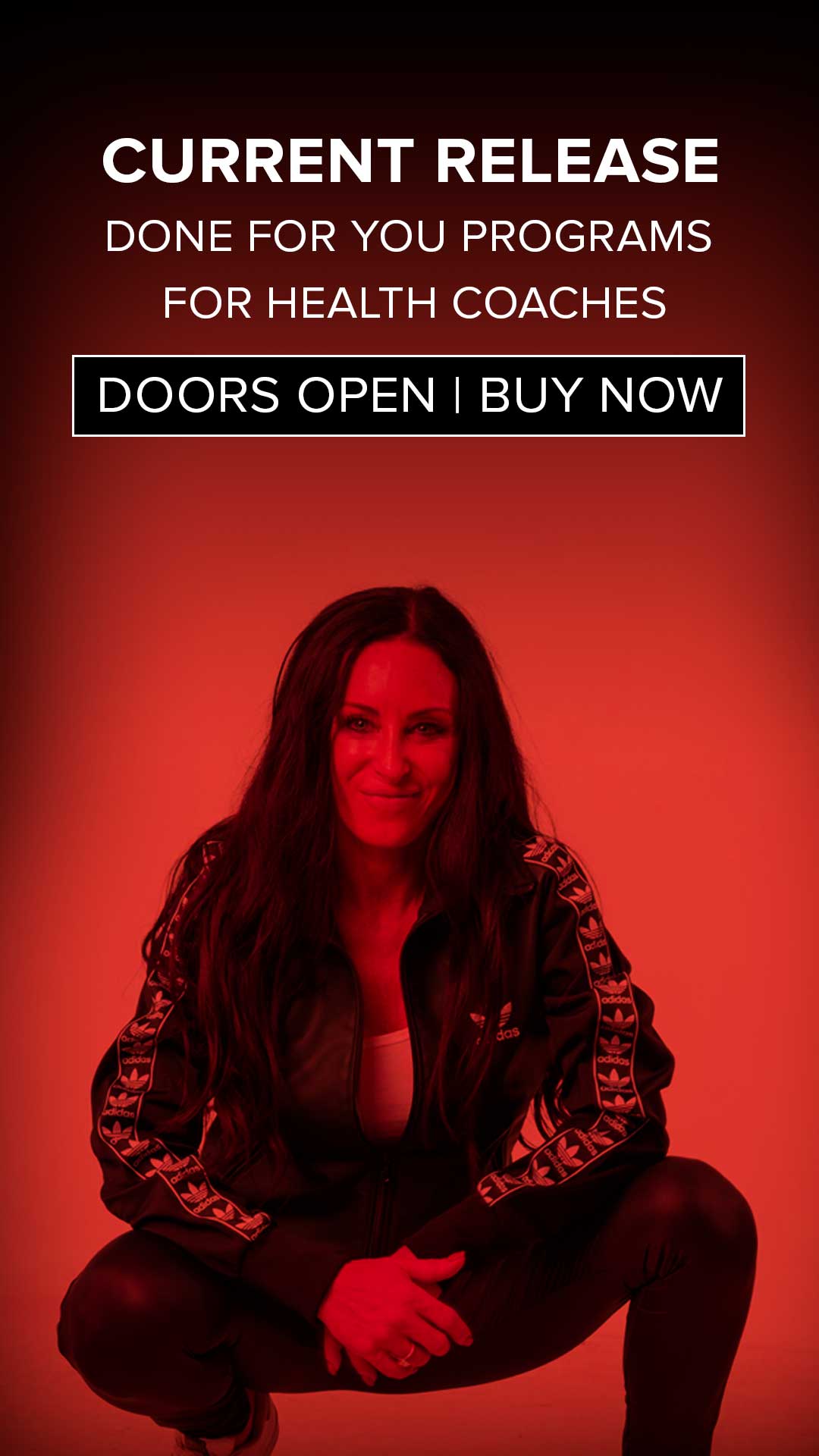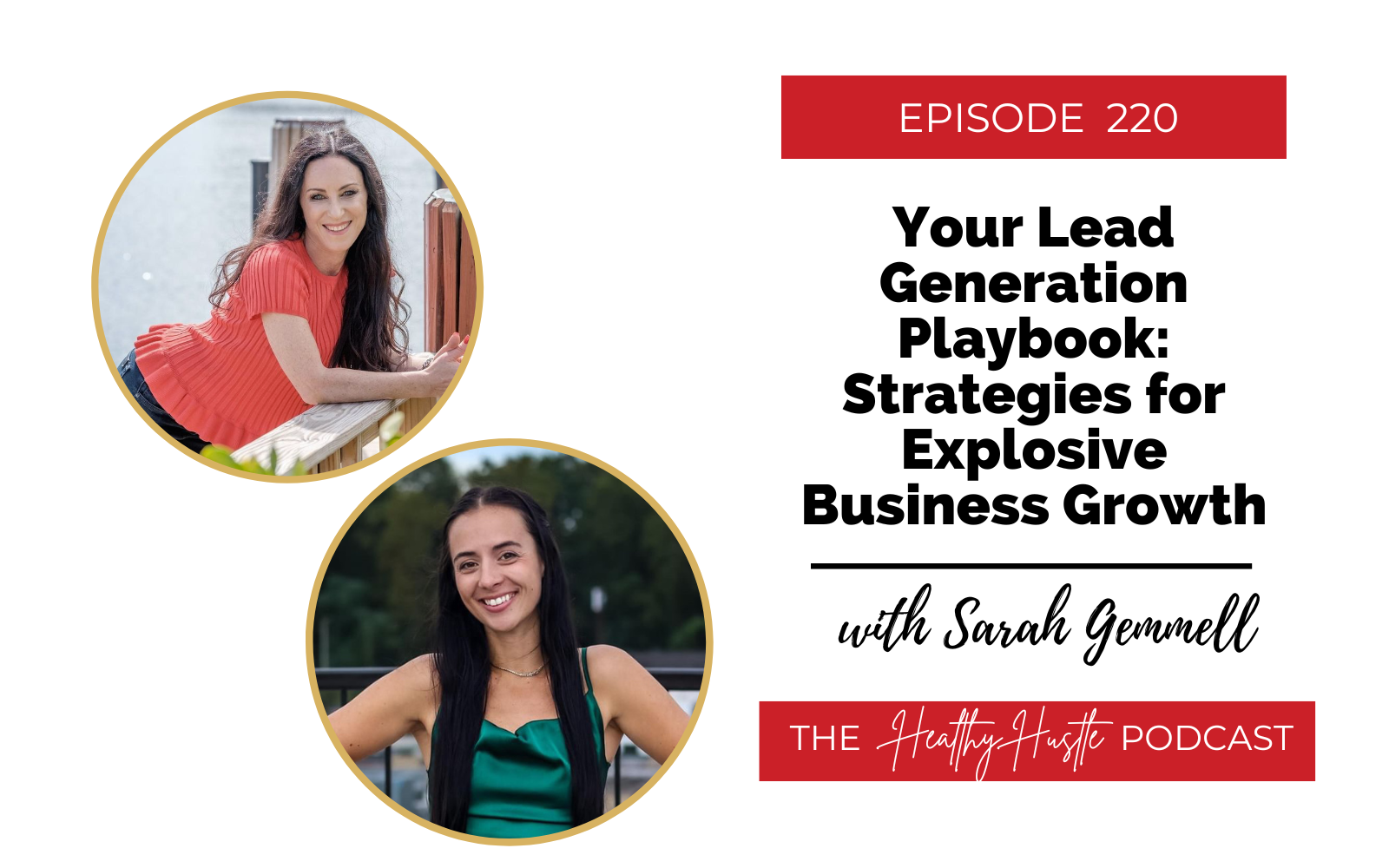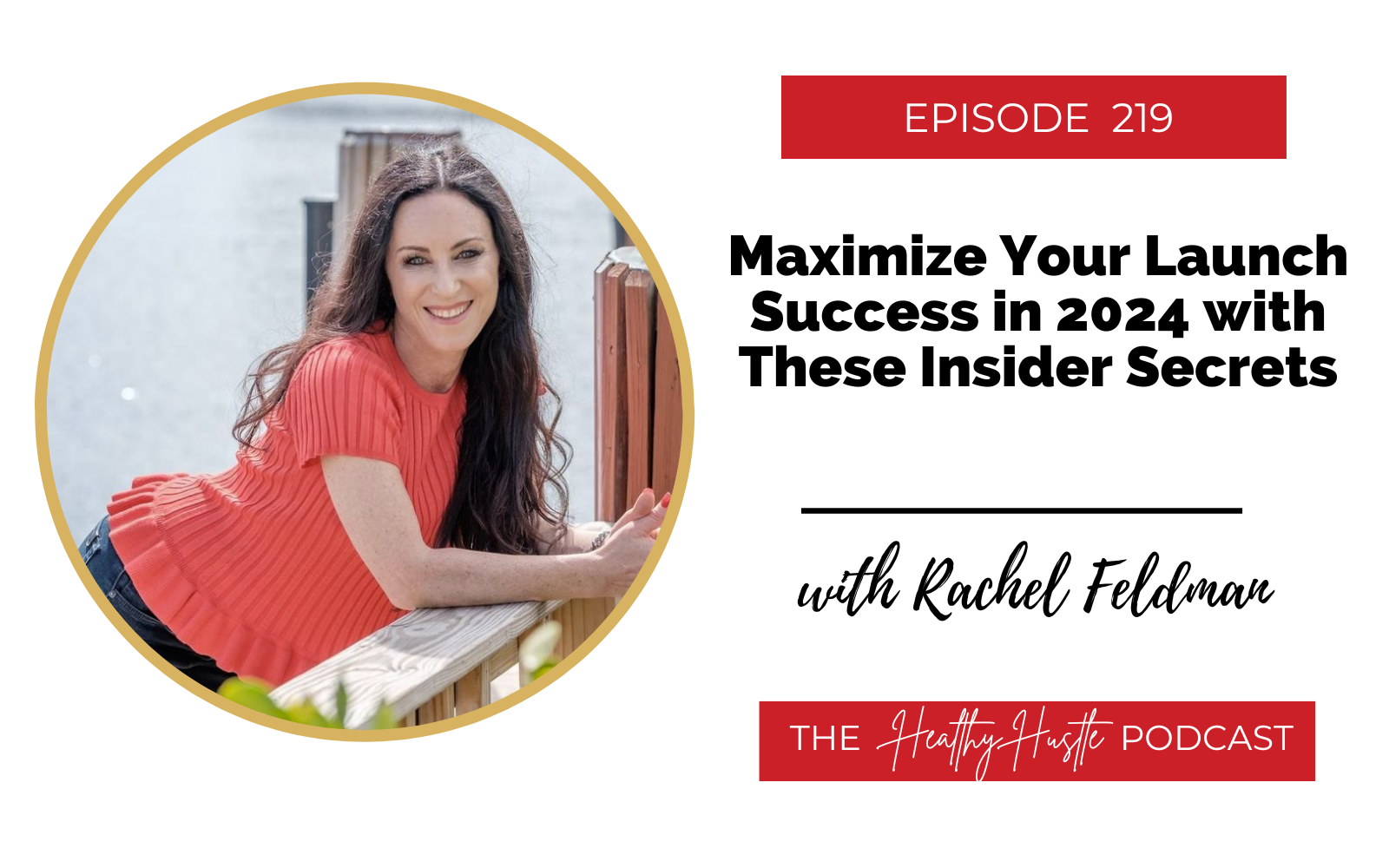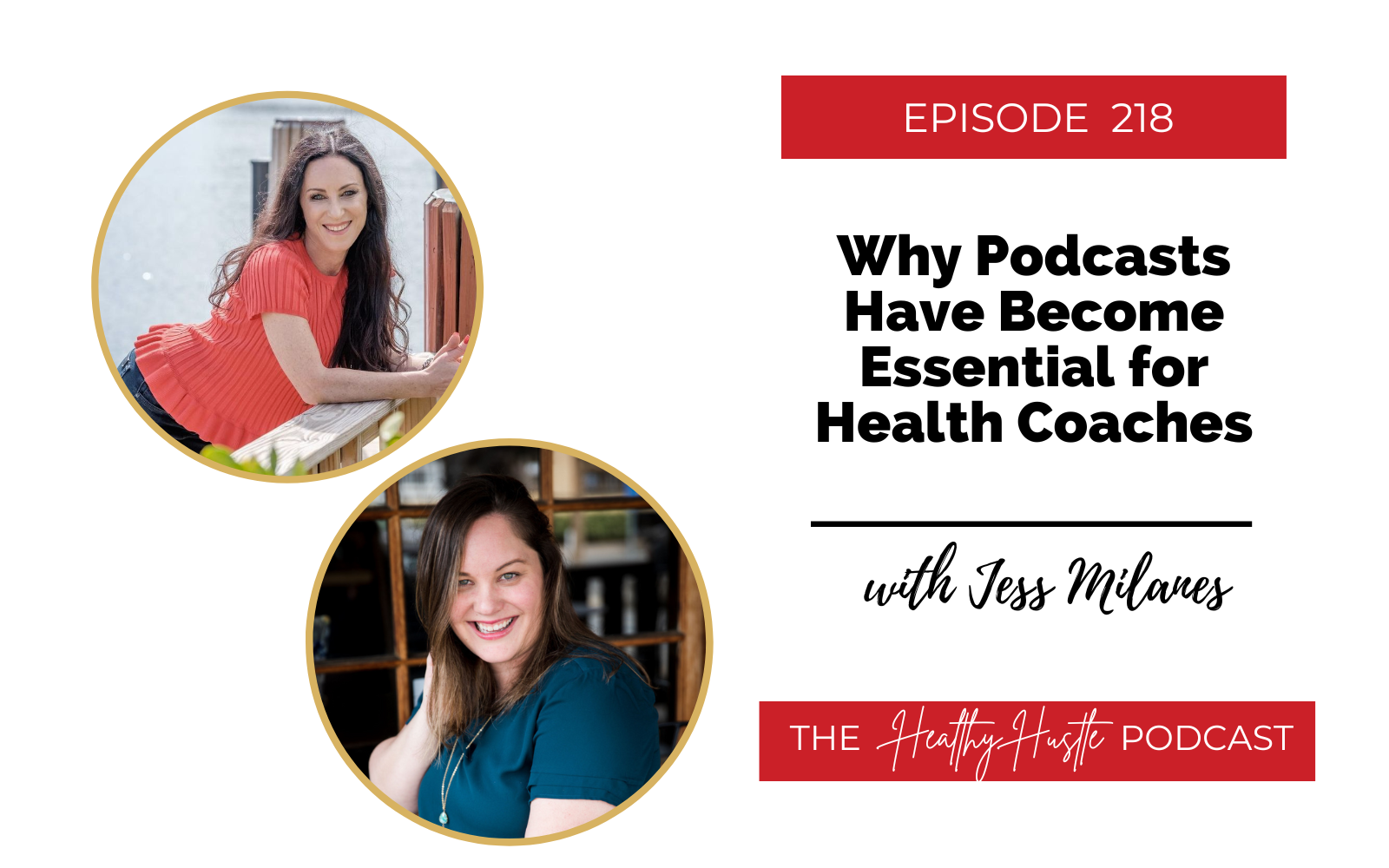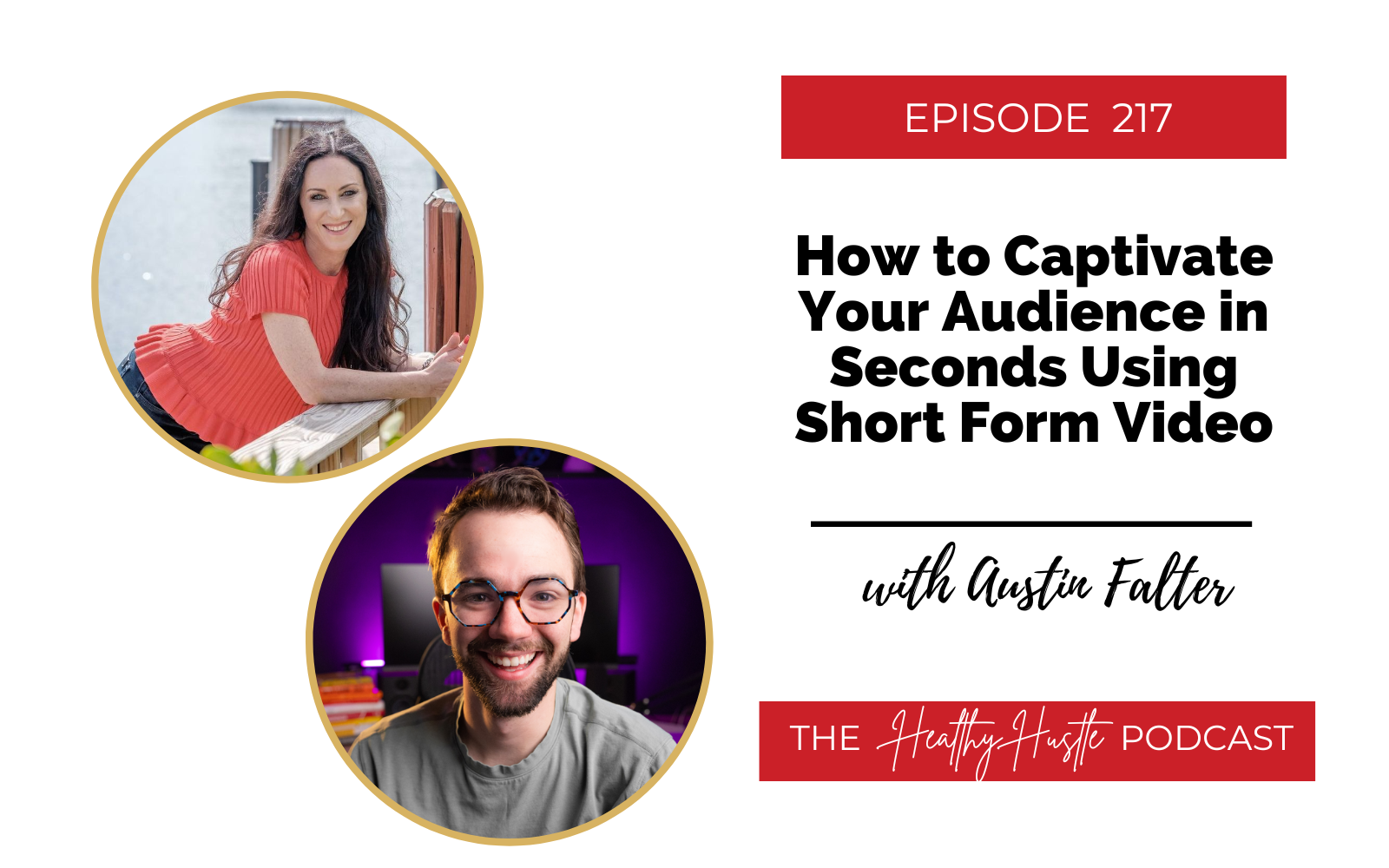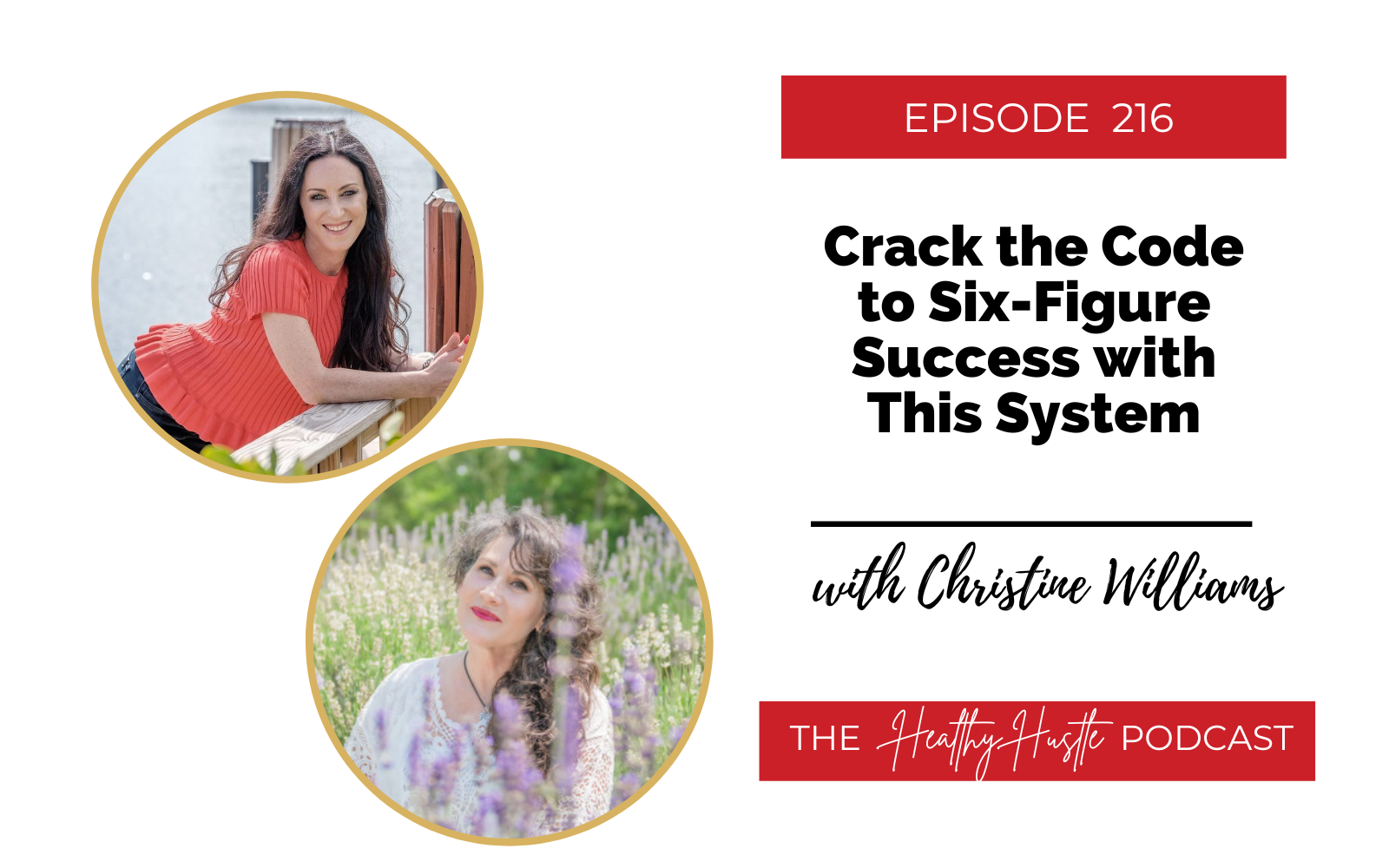It’s way too easy for health coaches to feel like their message is getting lost in the crowd. But here’s the thing – no one is you. Sure, there might be a lot of health coaches posting on social media, but no one has your unique story. Your story is a powerful marketing piece, and it’s the key piece needed to attract those soulmate clients and thus, scale your business.
I can’t stress this enough: When in doubt, always go back to your brand story.
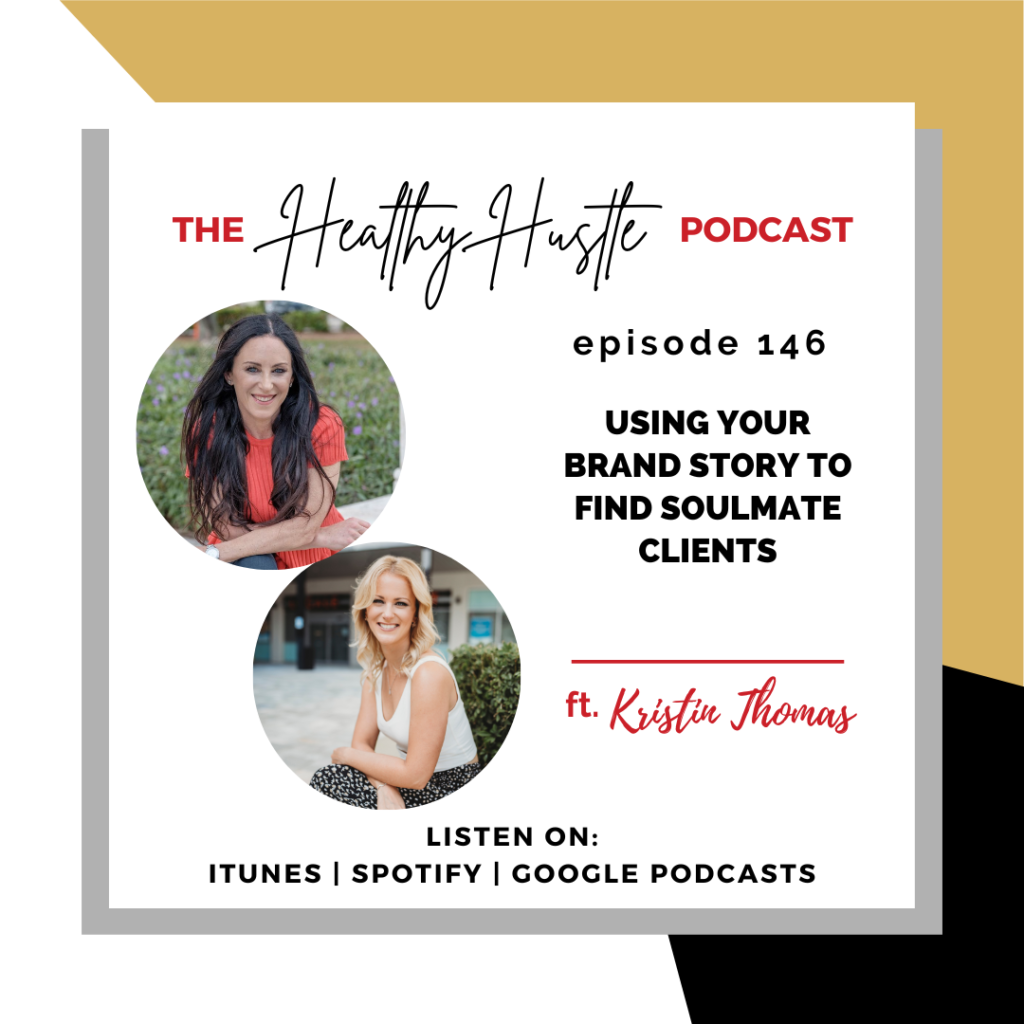
In this episode, I am talking to the amazing Kristin Thomas. Kristin is the CEO and founder of Health and Wellness Business School, Functional Diagnostic Nutrition Practitioner, and marketing expert. Kristin is the Queen of storytelling and is sharing all her juicy knowledge and tips so you can find your story and start sharing with your audience!
During our conversation, we talk about why brand stories are so important, what micro-moments are, why they matter, how to pick the right ones, and where they can show in your content marketing. Plus, Kristin shares her framework to get started on crafting your unique story.
Connect with Kristin:
Website: https://www.healthwellnessbusiness.com/
Instagram: https://www.instagram.com/healthwellnessbusiness/
Facebook: https://www.facebook.com/kristinelizabeththomas
Rachel: Hey, guys, I am so excited because I have my good friend Kristen Thomas here and she’s gonna give herself a proper introduction because I don’t want to mess it up. But this is for any coach who is struggling with figuring out how to get clients and turn them into lifelong clients. I know that in this world, we have a tough time standing out as coaches, we feel like there’s just so much busy noise. But Kristen is going to break down how to create that brand story so you do stand out. So Kristen, thank you so much for being here. Can you tell everyone a little about yourself?
Kristin: Sure! Thanks so much for having me, Rachel. So great to be here and to meet you. I’m Kristin Thomas, I am the CEO and founder of Health and Wellness Business School. We specialize in helping health and wellness professionals who already have their businesses up and running and they’re really ready to just solidify everything, make sure it feels really good and in alignment with what they do. We also prepare them to scale their impact so that they can reach more clients and spread the ripple effects of what they do.
I got into this because I was actually a former FDN health coach myself for over four and a half years after previously being a marketing professional for over 12 years specializing in helping early-stage small companies to get up and running, get everything about their marketing and business scaled to the point where they were ready to really take off in a big way multiple companies which got acquired. I even worked for Twitter for a small stint in my career too. I worked within one of the social media giants.
So I specialize specifically in helping clients with their copywriting and marketing and doing so in a really organic and authentic way, including storytelling, which we’re talking about today, in addition to sales and business and all the things so I’d love to talk about at all.
Rachel: If you got that, Kristin is your go to woman, if you’re a year plus in your business, and you’re ready to scale, and you’re looking for a great course. So make sure you follow her. And now we get to dive in deep. So tell me, why is a brand story so important?
Why A Brand Story Is So Important
Kristin: Storytelling is really powerful. Because if you think back at your family parties, or when you were a child, and you’re with your grandparents or anybody in your family, and they’re telling stories. Or why do different stories and fables get passed down from generation to generation? Because we relate to them. Because stories oftentimes mirror something that we’ve experienced or that we aspire to, and they’re very relatable. People relate to stories because we can relate to experiences that other human beings have and events that other people have been through that might be similar to what we’ve been through.
So when it comes to translating that into your business, it can be honestly one of the most potent ways for your content to go from getting crickets or maybe just your mom and your cousin liking your posts to actually getting dozens or hundreds or 1000s of real potential clients and people within your community to be engaging in your content and to raise their hand faster and say, Okay, I get what you’re talking about. You’re literally talking to me, this is the type of journey that I’ve been on or that I want to go through. And I need your help, because now I finally get what it is that you do.
Rachel: I hear this so often, I’m sure you do, too, where a coach says, I don’t have a story. What do you actually say to that coach?
Kristin: So we’ve had a lot of clients that have said that too, because I think a lot of health coaches do get into this space, because they’ve been through the health journey. So either way, in my opinion, there’s always a story, there’s always a path that took you to get to where you are.
So, for example, one of my clients from a couple of years ago, she specialized in helping women through lupus, she personally hadn’t been through lupus, but the reason she specialized in it was because her best friend passed away from it. Knowing what she knew years past that, she now knew how she could have helped her friend. So she was basically running her business in service and in honor of her best friend. It’s like giving me goosebumps just thinking about it. That is such a beautiful story to tell.
So whether you are inspired to get into doing what you’re doing because of somebody else in your life, whether a friend family member or colleague, whomever and that just inspired you, or maybe you were in school for something and a certain area of health and wellness stuck out to you and your interest, or maybe you just saw a commercial on TV and you’re like, That’s ridiculous health shouldn’t be treated that way. Or I want to get into this and learn as much as I can about it. There’s always a story.
Sometimes we just assume stories mean that they have to be a personal experiential journey of you going through that thing firsthand. But it might be something more external to you, but ultimately something inspired you so there’s literally always a story and everything.
A Framework To Get Started On Crafting Your Story
Rachel: So here we’re just imagining talking to a coach and she or he is like, I have no idea where to start. What are the initial steps that you can give them as a framework to start?
Kristin: I love that question. So the way that I explained it is look at your trajectory from where you are now until whenever you would consider that you started your journey, whether it was from childhood or from a couple of years ago. Create a timeline of the different events, circumstances, conversations, people that you met along the way that inspired you.
A quick example, you have a family member growing up who was dealing with a health challenge and you didn’t quite understand that, but you just knew that they didn’t feel well. Maybe that sparked an interest in health and wellness, and you just sort of started to eat a bit healthier yourself to prevent against that thing because you didn’t want to be dealing with what they were dealing with.
Or maybe in school, you sort of dial in more on learning about that thing or whatever. And then maybe a couple of years later, something else happened, or maybe a conversation sparked and reignited the fire in you. Or maybe an incident happened to you. And you were like, Oh my gosh, I really don’t want this to happen to me. Let me learn more about it. Therefore you enrolled in your school to become a certified health coach.
Think about what those micro-moments were. It could be one single conversation, one minute of an experience one day, it could be a smaller event. Think about the micro-moments that ultimately led up to where you are today. Every single one of those can actually be told in a story.
Where Micro-Moments Of Your Brand Story Can Show Up In Your Content
Rachel: So a coach may be saying, okay, we have a brand story. It’s a brand story showing up on an About Me page as your brand story everywhere, can you give me a little understanding of where those micro-moments show up? Yeah.
Kristin: So they can really be splashed anywhere. I would definitely recommend them to be on your website. Your about page is a perfect place. But also it could potentially be on your homepage, and maybe a condensed version of who you are and why you’ve gotten to doing this or why this is your mission or your passion. People love to know Why is this person really connected to people like me?
It could definitely show up on your bio on social media and definitely threaded into any and all of your posts. Even if it’s just an example, let’s say you’re talking about something around liver health, and maybe when you got into your 30s you started to experience adult acne and you’re like, What the heck is going on? And you realize maybe your liver was congested a little bit. Then you went on this journey and learned more about all of this stuff.
So it could be a combination between educating with your content, but you bring in an example of a story. People could be like, Oh, I’m experiencing adult acne and this is embarrassing, and I’m tired of covering it up with concealer. This person has a cool story that they’ve been through, and they clearly studied it. I want to be under their wing and learn how to do that, too. So can even just be inserted in everyday content as simple as a quick sentence or two.
Rachel: So it’s almost taking those micro-moments and looking at them throughout social media, whether it’s your behind the scenes video or doing something about me or your why different categories
Kristin: Yeah, I basically look at it as like, how can you really bring what you’re talking about down to earth? That’s what I believe storytelling really can do. Because even if somebody who’s reading your content hasn’t experienced the exact thing that you did, or in the exact order that that’s okay. They can relate to it because they’ve gone through something similar.
So that’s where they start to really perk up and be like, oh, this person really knows what they’re talking about. They’ve been there firsthand, or they’ve gone through a journey that connected them to it in some way. I want to work with somebody like that. Just look at how I can make my content really relatable.
The way I explain it to my clients a lot is like, rather than talking at your audience, which is just straight up educational content, where maybe it’s over their head, or they don’t fully know how it applies to them, you can still totally do that content, but maybe to make it more tangible and bring it into their role, tell a story, whether it’s a story about you, or a client or somebody in your life that went through that thing, bring an example. So then maybe the light bulb moment turns on and the person’s like, oh, okay, now I get it.
Weaving Your Brand Story In All Elements Of Your Marketing
Rachel: So let’s talk about brand story, even in other elements of marketing. Because I didn’t even know that you worked for a marketing company for that long. I knew you as a health and wellness coach, and I was so excited when you put your academy together. I actually know some clients who buy from me who have also attended your academy.
Let’s talk about your brand story. I hear so many coaches, they’re doing training workshops or doing webinars, and they’re like, when do I share the pieces of my story? How do I flow through that workshop? What is your suggestion?
Kristin: I’ve done dozens of workshops myself and walked a lot of my clients through them too. So what I would say is early on, I’d say within the first 10 minutes or so of the workshop, definitely do an introduction about who you are and give a little bit about your backstory. Basically, what got you to where you are today so they know who they’re talking to and why they should trust you.
Then as you’re going through your trainings, again, just like how I talked about everyday content on social media, or email. Be like, okay, am I explaining a concept that might be a bit complex, or maybe a bit more advanced or maybe could potentially go over my clients heads? Use an example, whether it’s yours, a clients or somebody else. Bring that up.
A lot of times, when I’m doing my workshops, I’ll teach on a concept. Then I’ll have a slide with an example of either for myself or a client and I’ll be like like, so and so who was here and explained their like point A, where they were struggling, and then talk about how the thing that you’re teaching them right now was coming up for them, and how you shared it with them, and how it created that lightbulb moment in their mind. And then the shifts or results that they got because of that.
That really brings it down to what your audience sees, oh, somebody similar to me, was working with him or her. Therefore, suddenly, it communicates that you take on clients, you have a business, and you have a program. So that’s really helpful for your business. And then it helps them see oh, this same advice helped that person in a similar place to me to get to where I want to go. So this must be part of the gap that I need to fill. And it basically keeps them wanting to listen because you’re earning their trust through more of those stories and it just builds more credibility because it shows you’re getting clients’ results.
How Your Brand Story Helps You Get Clear On Your Niche
Rachel: Let’s talk about brand story and niche. Do you suggest this for a coach, that is, I wouldn’t say just struggling, but who is redefining their niche? Or would you suggest writing down that timeline, and that brand’s story first to help you get clear on your niche? What is? What is your approach to this?
Kristin: That’s actually a really interesting question. So in my work, we actually do a lot of human design-type work. I don’t know how many of you who are listening to this know about human design or into it, but it basically just brings so much of what you do down to a very individualized level.
So interestingly enough, there’s about five different types of human designs. Certain types are actually better served at having a specific niche versus others. We always understand our client’s human designs first to guide them towards that. So if you are more prone to and aligns to having a niche, then either, for a lot of clients, they just come to us innately knowing this is what I want to focus on either because they’ve been through it themselves, and they now have a passion for helping others or like I said, maybe it was some other life event or person that inspired them to do that.
If you’re not sure what you want your needs to be, if you are designed to have a niche, then it could be a matter of writing out your timeline. Because maybe there’s multiple facets, maybe you had some thought health stuff, maybe you had some autoimmune stuff, and you have some hormone or infertility stuff going on. If you don’t know which one to focus on, write it out. Really get back into the moment of what those different areas were, and which ones do I feel most excited about? Or most confident that I could help people? I think that timeline could definitely help if you’re figuring out how to do the niche.
How To Pick Out Those Defining Micro-Moments
Rachel: So let’s even go back to the framework because I think it’s really important for a coach to understand that your brand story can attract your ideal client, and it’s what sets us apart from somebody else.
What would you say if a coach who has so many of those micro-moments –what do they do? Because I feel like everyone is either I have no story, or I have so much. What do I actually include? It’s so important for your “about me” to have that. What would you suggest to pick out the defining micro-moments? How does one not stop?
Kristin: Yeah, I love that question. It’s basically just looking at, what are all of those micro and macro moments? And then, which ones were the most pivotal or most defining for your journey? So if there’s a micro-moment that you’re like, Yeah, that was interesting, but like, it wasn’t really a game changer. It’s just a small little thing. So maybe that’s better used as an example in a post. It really doesn’t need to take up space in my bio, or some really important piece of content. So just discerning if it’s monumental. Was this a big pivotal moment? Or another criteria you could look at is, could other people relate to this? So if you have a very obscure thing that happened to you, that people would be like, What the heck are they talking about? Probably good to leave that one out. You’re gonna lose them. So maybe leave that thing out.
If in the future, you’re writing some piece of content and it becomes applicable, great, bring it up. But if it’s super obscure, random or weird and not really relatable, then I’d probably keep it out. And also just drawing a fine line between that because a lot of health issues can be a bit personal or vulnerable, sometimes even a little bit gory, depending on what’s going on. Knowing that just being a little bit discerning with that when you’re sharing content, then there’s a very fine line between vulnerability and just going too far and almost repelling people because they really didn’t need to know what happened to you in the bathroom that day. That’s too much. So just knowing where that fine line is, and just trusting your gut with that. If you’re like, Yeah, I was a bit too far, then maybe tell another story instead there,
Rachel: Then do you suggest updating your brand story?
Kristin: Yeah, if it changes, I would say so. Especially as most entrepreneurs we’re evolving over time. So my brand story that I used when I was health coaching is more different than the one that I use today as a business coach for health coaches, because I then went on my journey to build that business and then transition into business coaching. For example, as a health coach, maybe you have multiple evolutions, even in your own business, maybe you started off focusing on one area of health, and then maybe you realize the power of the mind in that you layered on mindset. And maybe you went through some mindset certifications and trainings, then that’s an evolution in your journey. So then you can update it if something happens.
How To Dial Down On Your Niche
Rachel: Tell me your take –I know you specialize in the coach that’s a little more advanced, but I think this would be great to add in some new coach info for the coach that is just feeling like they specialize in everything. What would you say to that coach who’s really trying to dial it down? Do you believe in niching down?
Kristin: I do. We also have experience working with a lot of new practitioners, we have a whole foundational course that walks through one of the core parts is niching, actually. What we hear from a lot of new health coaches is the fear of niching down because I’m afraid that it’s going to repel somebody who could pay me and right now. I just needed to bring in money. And that’s a totally valid concern. If somebody comes to your virtual door, physical door, whatever, and wants some help and maybe they’re not a true, what I call a soulmate client, like an absolute ideal client you want to work with, but they seem pretty cool. And you could help them and you need the money, then great.
But generally speaking, the way that I explain it to coaches is that it seems counterintuitive to start your business dialed in on a niche, but we think we need to be everyone in front of everything and everybody right now. But the reality is that when you have a niche, it actually makes it way more clear to people off the bat what you do and who you do it for versus if you’re a generalist, and one day you’re talking about hormone health, the next day about gut health, the next day about liver health, and so on and so forth. Even though you know us as practitioners, we know that those are all very interconnected. And really, you’re probably working with your clients on all of those. But your audience doesn’t know that yet and it actually confuses them.
So from a marketing standpoint, there’s a difference between selling them what they want and then give them what they need. So if they don’t know that they need liver support hormones, or gut health support, whatever, and they’re aware of maybe just one of those. And that’s also an area that you’re really lit up about, make that your core message, but then know that inside your program, you can be the general so you can work with them on all of those and help them see the connections.
If you decide to dial in on the gut health coach, for example, and they’re aware they need help with it. And they see that time and again, your bio is dialed in for gut health and so is your content, so he’s talking about your stories, your lives, whatever, they’re gonna know that you specialize in the gut versus if every 10 posts, you’re talking about the gut, they’re gonna be like, Well, I don’t know. The posts from three weeks ago, they talked about it, but not really recently. But so and so over here, who I follow, they talk about it all the time. So they must be the gut health experts. So let me hire them because I trust them more. So it’s about that consistency over time of telling the same type of message over and over and over, that cements that and builds that trust. And that’s how people will convert a lot faster versus following you for a while and trying to figure it out. Like do they know that guy? Or do they not? I don’t really know. It just helps them come to that conclusion a lot faster.
Which Social Media Platforms Can Help You Get Soulmate Clients
Rachel: Since you’re the marketing Maven, we talked about all these different social media platforms, we’ve talked brand stories, we’ve talked niche. Now let’s talk about all these different social media platforms. What is your favorite way or what do you find for your clients that has worked to get the lifelong clients that we’re all looking for?
Kristin: It’s so interesting because social media is evolving, I would say faster than ever. There are so many channels out there. I would say from the clients we’ve worked with, the majority of them are still seeing a lot of success from Instagram. Yes, the algorithm is changing. Yes, Reels has changed the game. And it’s basically ticked up now. But Instagram is. They’re owned by Facebook. They’re one of the biggest social media platforms. So there’s a ton of people of all age groups on them. Unless you’re working with a much younger demographic that maybe is all on Tik Tok, or something like that.
I think it first and foremost comes down to knowing your audience. What’s their age group and demographics? Where do they typically hang out? If you’re really not sure, it might be worth doing some market research. Do you know some people in your world who are in that demographic or know people who are and ask them what social media platforms do you use? Or where do you go to find information?
What I love about Instagram, and I think why a lot of my clients use it is because even though it has a TikTok vibe to it. Now with all the Reels, that’s great for demonstrating a lot of various health things, and they’ve got stories and posts. It’s so multifaceted for how you can put out content, you can still do lives and everything. So there’s a lot of extensibility there.
But we also have a lot of clients who use TikTok and some have literally gone viral on TikTok, or they’re using TikTok and Instagram. So sometimes it’s a fusion of the two. But I’d say if you’re a newer practitioner, I would recommend starting with one platform and getting really comfortable and good and getting into a rhythm before overwhelming yourself and be like, Oh my gosh, I have four channels to manage. Don’t start repurposing content. Because four channels to manage, it’s overwhelming, but not when you get one piece of content and turn it in multiple ways.
Rachel: Exactly. I’m a huge fan of repurposing content. So yeah, I can do multiple channels whether you’re new or experienced. Yep, repurposing is definitely a game changer. Do not reinvent the wheel. But yeah, just to go back to the question, I’d say we’re seeing Instagram is still working big time for health coaches, but TikTok is taking off in a big way. And some of our clients still see a ton of success from Facebook. So I think it really depends on your audience and also, equally what channel you’re comfortable with.
Tips For Writing Your Brand Story Copy
Rachel: Yeah, I love that because I think there are people who instantly gravitate to Tik Tok. And there are some that have stayed in Facebook and done groups and really have success. Let’s talk about copywriting because it’s one of those things that everyone uses this word copywriting, but I think getting into some specifics for that coach who’s struggling to have writer’s block, what are your tips for working on your copy? To get it to be banging?
Kristin: Okay, do we have five hours to talk? I can go on forever about that. I would say some of the top things I could speak to around tha. First of all, being open to wherever, whenever and wherever your creativity sparks. I know, for me, my best content ideas never happen when I’m forcing myself to sit at my computer with a blank screen in front of me. I’ve been a copywriter for 14 plus years. And I just can’t do that because that just doesn’t work for me. And I’ve heard that from so many other people too. So be open. Maybe an idea comes to you when you’re in the grocery store. Or when you’re out on a walk or when you’re watching a soccer game for your kids or something. It can literally happen anywhere. So be open to that. Take note of that on your phone, whether you want to do a voice recorder or type it out or something and capture those ideas on the fly. I always believe those are the richest ideas when they just come to you in a whim.
The other thing that I would say that I see a lot of health coaches struggle with, especially those who haven’t been trained in copywriting is to make what you’re saying as tangible as possible. There is a lot of jargon in the health coaching space in the health and wellness space, and even just in the general coaching and mindset and spirituality spaces, depending on what sort of you’re in. There are a lot of words that go straight over your audience’s head if they don’t understand that. Given that we have about three seconds to capture your audience’s attention online before they scroll on, you start throwing at them a ton of complex terms or words that they don’t understand. They’re not going to sit down and like Google the definition or try to figure it out. It’s too much work. They’re going to scroll right on.
I usually tell my clients like, get your idea out there just write it out imperfectly. Just get it all out there. But then go back through with a couple of lenses, one of which is this jargon like is this a health coaching term or wellness term or something that the average person I work with wouldn’t understand? So that goes back to knowing who your audience is and how informed they are. If you have a very well-informed and educated audience maybe they can handle more advanced content versus if you have people who are maybe just freshly transitioning from conventional medicine to holistic and starting to learn their own health and wellness terms.
Rachel: Really know your client in the verbiage that it’s going to get them excited.
Kristin: Exactly. You can even pay attention to that when you’re on coaching calls with clients or sales calls, what words are they using to explain their health challenges? Can you use that in your content? Because that’s where you’re going to speak into their world and speak to them. And they’re going to understand that more so by doing a jargon check. And then also just looking at it like, is what I’m saying understandable?
Earlier, I was talking about bringing to life a story or something like that, versus just simply throwing at them a ton of new information that might be overwhelming, how can I really bring it down to earth and speak their language and mirror a scenario that they might be going through?
Rachel: I love that you’re bringing that into brand story, because I feel like our story trumps so much of those copywriting words. It’s one of the reasons that I love video, even though it can be extremely scary to do video. I think that in video, you’re able to get that story out so easily. I know that was the saving grace that I had at the beginning of coaching. It’s like, okay, I have writer’s block. This is tough for me. These are complex terms that I’m trying to explain. Let me just explain in video.
Kristin: Exactly. The moment that I decided when I was health coaching that I wanted to start storytelling is pretty early on in my business. So I obviously knew that that mattered. But no, it was a very vulnerable story of my journey through ulcerative colitis. I think it was about a year into my practice, I had a really big story to tell where I was basically cleared of all sort of colitis all together. Not only was I on a mission, my doctor was like, there’s zero sign of it. I had a picture and my husband took it with me in the hospital bed and I was smiling because I was declared in remission. That was a huge thing for me. I posted that post as my husband was driving me home, I was still like half out of it. But I was writing the post posted later that day, and it literally went viral, like my phone did not stop blowing up for like 24 hours. And that’s literally when my business took off. And from then on out, I kept dripping out my micro stories even more intentionally and unpacking different parts of my journey, because people had finally seen, okay, she’s been through what I’ve been through, and she really gets it. And now she’s finally been declared in remission. And that’s amazing. I want to be a part of whatever she does. So storytelling can really pick up your brand and your sales in a huge way.
Why Storytelling Is So Vital To Your Marketing
Rachel: Would you say that it’s one of the most vital components if you’re looking at all of the marketing and building a practice?
Kristin: Yeah, I’d say hands down. Even the data that we see from our clients 9.9 out of 10 times, the storytelling content trumps an educational post, or if they included an example of a story or thread of the story into their educational posts, it does better than a post that was thrown with jargon, and all sorts of complex stuff. It’s just relatable, and it gets people out of the woodwork to pay attention and engage faster than if they’re trying to figure out what you’re trying to say, and it doesn’t really land with them.
Rachel: So is there anything that you think we’ve missed in branding and storytelling?
Kristin: I think the other part would be bringing on more client examples. The tricky part, obviously, in health and wellness is privacy. You want to either get some sort of signed agreement or some sort of verbal or written, ideally, consent from a client to tell their story or do it in an anonymized way and some clients might even request you to anonymize either way. The story matters more than including the name. Obviously a name and photo are the absolute best if you can get those but if you can’t, just anonymize a story to say one of my clients. You don’t have to tell any details about who they are or anything like that. Leave their names out if you need to, and just tell client stories.
As much as it’s great for your audience to hear your story, you’re also on what’s called the hero’s journey, you’re already so many steps past where they are. Sometimes if your audience is in a lot of pain or just really stuck and struggling or they’re at total square one, then where you are can almost seem so unreachable. Sometimes when you tell that whole journey and they see where you are today having full remission, all this stuff and they’re over here being like, I’m in flare up after flare up. I’m in and out of the hospital and this is so bad that I don’t know if you can help me because you’re so far beyond it.
So tell us stories of clients who were in it and maybe not even waiting until the entire program with that client is done. Because just like with your story, there are micro-moments of wins and stories in your work with clients. So maybe in your kickoff call with a brand new client, you share something with them, that’s just a huge lightbulb moment and it’s amazing to them. You don’t have to wait until a client is done with your program and fully better to share that content and tell the story. You can drip it out as it goes along.
For those of you who run lab testing, for example, if you discover something, and they’re like, that’s really interesting, tell the story around that versus waiting all the way until the end. And you can do both as well.
Rachel: I love that you brought that up, because I think you’re gonna attract clients at different stages. And to get that client to really trust you and say, this is the person I want to work with. And that’s ultimately how we get our clients.
Kristin: Exactly. Also what it does is helps to unpack your program into the micro-steps and help people see step by step what it could be like to work with you. So rather than telling them that you have this coaching program, and it’s six months long, and all this stuff, especially if they’re new to coaching, they might have no idea what that means, or they don’t know that a coaching program is what they need to get better or that it’s six months that they need until they get better.
They don’t know that because they can start to see, oh, wow, he or she covers this amount of information, the kickoff call, I can imagine myself being on a kickoff call and going through that and learning that from them and walking away clear already. That sounds great.
So breaking apart little features of your program not only suddenly sells it because you’re basically talking about what your program includes. But it’s also just helping them to really start to conceptualize what it’s all about.
Rache: I love that you gave those examples because I think even when we listen to podcasts, we are like, Okay, give me an example so that I understand it in my own brain.
Kristin: Exactly. So again, going back to using the words that your audience is already using.
Rache: Can you tell everyone where to find you? Because they’re definitely going to want to follow you?
Kristin: Absolutely. You can check out all that me and my team do on our website, healthwellnessbusiness.com. We’re also on Instagram at that same handle. I’m also on Facebook. You’re welcome to friend request me and connect there. My name is Kristin Elizabeth Thomas, Kristin, with an I on Facebook as well. So anywhere that you are, I would love to connect with you and hear from you.
Rachel: Do you have any last piece of advice that maybe we missed? Or did we cover at all,
Kristin: We covered so much but I could go on for hours. I think the last thing that comes up for me is an analogy that I bring up to a lot of our clients when it comes to copywriting and storytelling. A lot of times we hear from coaches that they just struggle to get the post started.
So I always recommend, think back to some of your favorite TV shows or movies, how do they start? They don’t usually start at the beginning of the story. They’re throwing you right into the fire when somebody is running away from a wedding or when a buildings on fire or when there’s a car accident or when somebody drops a truth bomb on somebody or whatever. You’re instantly hooked because you’re like, what’s happening? Who are these people? Why are they upset? What got them to this point, and you’re reading it and you’re not reading? You’re watching? You’re continuing to watch it because of that.
So thinking of when you write content in terms of, how could I start at the height of my story in a really interesting place. So one of my stories that I told as a health coach was of the time that I was in the ER in the middle of the night because I was having such a bad ulcerative colitis flare up. I didn’t start the post talking about day one of me getting symptoms and then all the way through many years later of me being in the hospital and middle of the night, I started my post off with it was 2am and I was staring up at the fluorescent lights in the ER wondering how the heck did I get here again.
Literally putting myself in the shoes of a writer for a TV show. Then I sort of did the backstory of explaining how I got here and what was going on. And then what I did from there to ultimately get out of those recurring flare ups. And that post again, was a viral post because it hooked people. it spoke to a snare that my audience resonated with because they had also been in and out of the hospital at all hours. I spoke into their world in a certain situation they understood and I built in treat.
So next time you guys are watching your favorite show or movie, just pay attention to how they start, and start to then think about, what were those timeline moments, those micro-moments that I wrote down for myself, and how can I use those as what I call the hook, the first line your post and do it in a way like my show, my favorite show is doing it.
Rachel: I love that. I want to thank you so much for being here. Thank you for your time and this has been so valuable.
Kristin: Thank you so much for having me. It’s so much fun.
Rachel: All right guys, you know what you need to do? You need to follow this woman. Make sure if you have any questions you reach out to her and her team about her Academy, and it’s been a pleasure to be with you.

